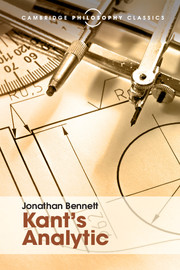5 - Intuitions of space and time
from Aesthetic
Published online by Cambridge University Press: 05 July 2016
Summary
A priori concepts and a priori intuitions
In both Aesthetic and Analytic, Kant seeks to prove synthetic a priori truths about all experience. Between these two sets of results there are, he thinks, two radical differences.
Firstly, ‘the concepts of space and time…must necessarily relate to objects…Only by means of such pure forms of sensibility can an object appear to us, and so be an object of empirical intuition’; while the concepts treated in the Analytic ‘do not represent the conditions under which objects are given in intuition’ but only those under which objects can be brought under concepts, i.e. thought about, classified, generalized over. Here, as in the next quotation, ‘object’ does not mean ‘objective particular’ but has the very general sense of ‘datum’ or ‘something given’. The Aesthetic, then, tells us what all our intuitions must be like, while the Analytic tells us what our intuitions must be like to be intellectually manageable.
This suggests that the Aesthetic's conditions might be met although the Analytic's were not, i.e. that there might be unconceptualizable intuitions. Kant does indeed say:
Everything might be in such confusion that, for instance, in the series of appearances nothing presented itself which might…answer to the concept of cause and effect [which, according to the Analytic, must apply to our intuitions if they are to be thinkable at all]. This concept would then be empty, null, and meaningless. But since intuition stands in no need whatsoever of the functions of thought, appearances would none the less present objects to our intuition.
However, he intends this only as prima facie possible—as not obviously impossible—and he later argues that after all there cannot be intuitions which are not brought under concepts. In the passage just quoted, Kant is not affirming that ‘intuition stands in no need whatsoever of the functions of thought’; he is putting it forward as prima facie possible, as credible to anyone who does not know the arguments for its falsity.
One could, unjustly, say that Kant has a working picture of the Aesthetic as stating what the sensibility does to intuitions as they come into existence, and of the Analytic as stating what the understanding does to them immediately thereafter.
- Type
- Chapter
- Information
- Kant's Analytic , pp. 64 - 72Publisher: Cambridge University PressPrint publication year: 2016



